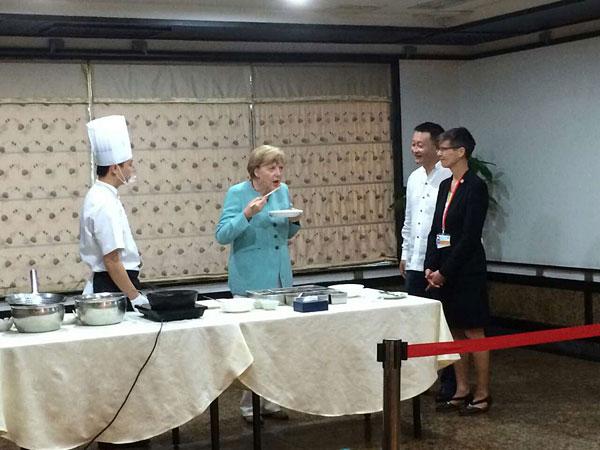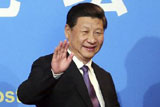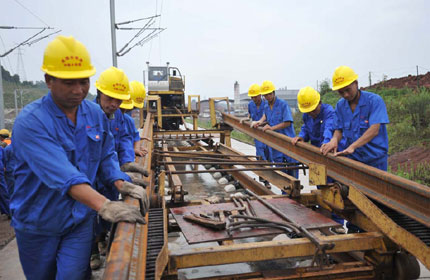Beijing, Berlin getting closer despite geographical distance
Updated: 2014-07-06 16:06
(Xinhua)
|
|||||||||||
|
 |
| German Chancellor Angela Merkel eats kung pao chicken, a spicy Sichuan dish made with chicken, peanuts, vegetables, and chili peppers, at a Sichuan restaurant during her visit to Chengdu, the capital of Southwest China's Sichuan province, July 6, 2014. Merkel kicked off her 7th China trip Sunday in the Southwestern city, a place that German companies regard as a springboard to the relatively underdeveloped western parts of China. [Photo provided to China Daily] |
The fatigue of nearly half-day flight between the two capitals cannot prevent Angela Merkel from embarking on her seventh trip to China as the German chancellor this weekend.
During her four-day stay, Merkel will meet Chinese President Xi Jinping and Premier Li Keqiang, both of whom have paid a visit to Berlin since they took office last year.
 |
| Xi visits western Europe |
The frequency of high-level mutual visits is a clear indicator of the closeness between Beijing and Berlin and the level of importance that both countries have attached to each other.
It is fair to say that China-Germany relations are at their best in history, which have been strongly underpinned by the pragmatic cooperation between the two economic heavyweights.
For starters, it is worth noting some basic figures. Germany is now China's largest trading partner in Europe, while China is Germany's biggest in the Asia-Pacific region. Two-way trade stood at $161.6 billion last year, accounting for nearly one-third of the grand total between China and the European Union (EU).
One fact that lies behind those remarkable figures and stays barely noticed is that both China and Germany are manufacturing powers and world's leading exporters, but they for the most of the time managed to avoid a trade war and stood together for free trade.
Merkel earned applause from China last year for her opposition to the EU trade investigation into Chinese mobile telecommunication equipments.
The unusual co-action between the two exporting powerhouses is deeply rooted in their economic complementarity.
As Xi put it during his visit to Berlin in March, the China-Germany cooperation is a perfect blending of Chinese market and German technology and an alliance between Chinese speed and German quality.
When German companies are eager to sell their sophisticated products to the fast-growing Chinese market, China is equally keen to learn from Made-in-Germany for its own economic upgrading.
The visit saw Merkel accompanied by a high-profile business delegation including executives of Siemens, VW, Airbus, Lufthansa and Deutsche Bank, all familiar brands to the Chinese.
There is high expectation that the German chancellor will find her ongoing trip as fruitful as ever and bring her country one step closer to China.
Related Stories
Merkel's visit to intensify cooperation 2014-07-05 06:56
Merkel phone tapping claims 'noted': Chinese FM 2014-06-06 21:47
Xi, Merkel hold phone talks on Ukraine crisis 2014-03-10 04:37
Germany investigates alleged NSA Merkel phone tap 2014-06-05 09:22
Merkel disappoints on Holocaust visits 2014-03-28 07:56
Today's Top News
Gambling costs World Cup fans their lives
US supports Ukraine's decision to suspend ceasefire
It's all about making a spectacle
China likely to see 7.5% growth in second quarter
Palace Museum feeling the squeeze of visitors
Myanmar pagoda replica given to China
US sends 300 more troops to Iraq over concerns
Hong Kong at the crossroads
Hot Topics
Lunar probe , China growth forecasts, Emission rules get tougher, China seen through 'colored lens', International board,
Editor's Picks

|

|

|

|

|

|





